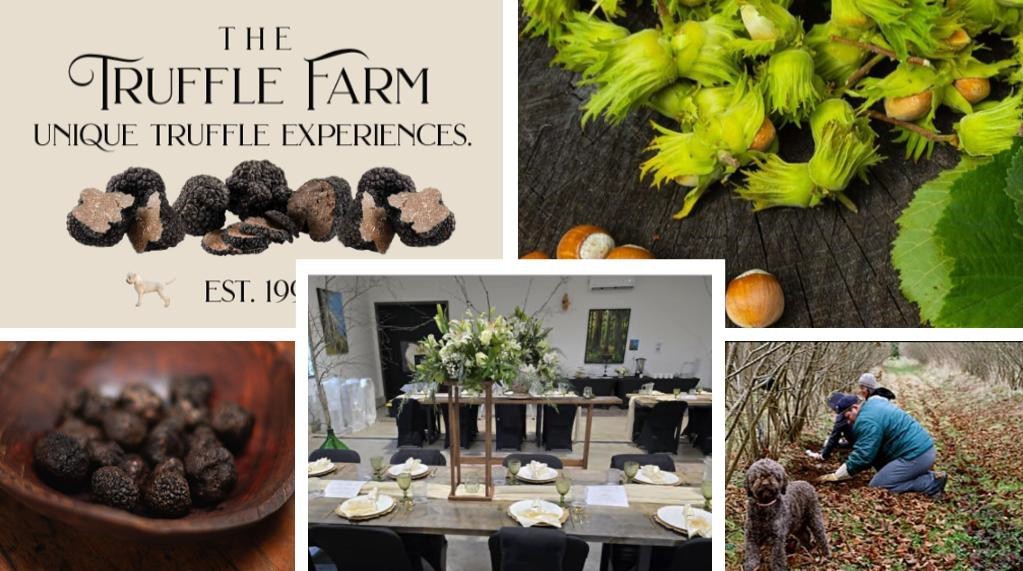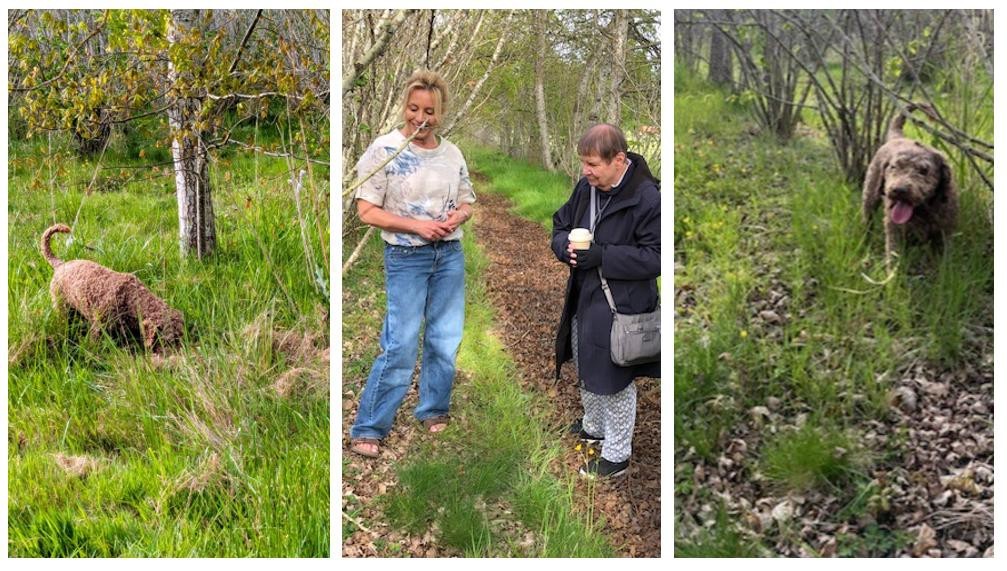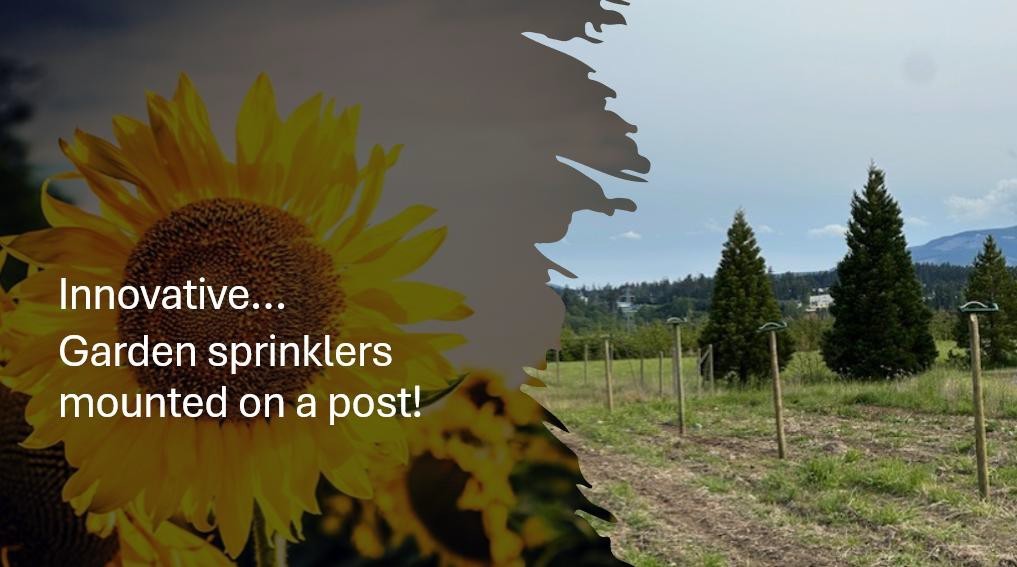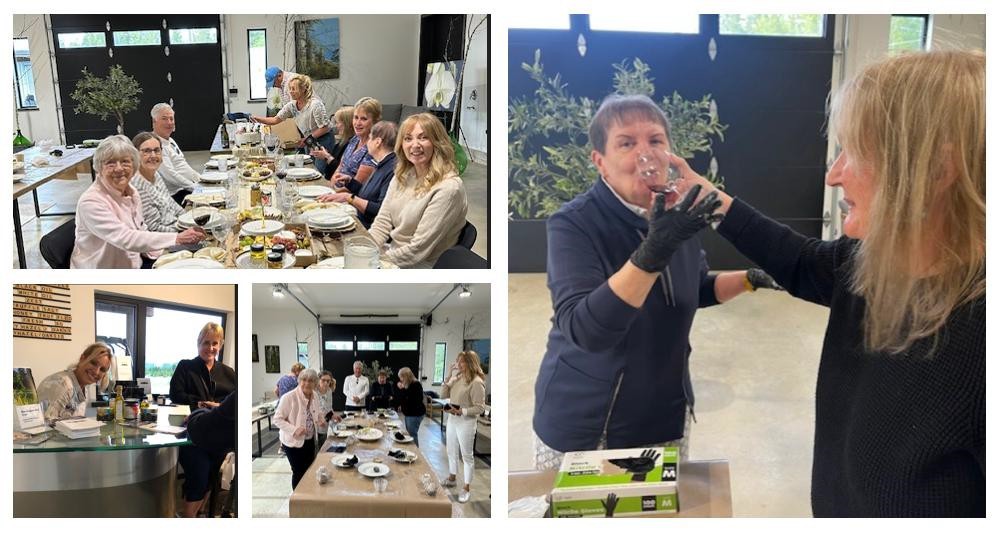The Truffle Farm – Guided Tour, Workshop and Tasting Event

On a beautiful May late afternoon our group of eight visited the Truffle Farm in Parksville (next door to
Morningstar Farm) to learn about truffles, the fungi that could be considered as “Caviar of the Earth.”
Upon arriving at the Truffle Barn, we were met by Pete and Virginia Brietzke and King Caesar, their friendly
truffle-hunting Lagotto Romagnolo dog.

After learning about what inspired Pete and Virginia to want to grow truffles, and with a cup of Island
harvested tea in hand, we headed out to the Truffle Plantation for a guided tour. As we walked, they
explained to us about how truffles are grown and about the various types of trees they had evaluated,
and the process it took to cultivate and harvest the Black Perigord truffle. We also learned how they
inoculate the trees with truffle spores. The fungi develop a relationship with the roots of the trees, which
means that without specific trees, there are no truffles.
Wow, farming for truffles is not for the faint of heart! It typically takes six to seven years before the first
crop can be harvested, and the process requires well-drained, alkaline soil and a lot of patience.
Pete showed us how to look for tell-tale signs of a possible truffle location. They are easy to spot because when truffles start to grow, they release a natural herbicide that kills grass and weeds. If you notice that no vegetation is growing around the trees, that’s a sign that truffles might be developing. Of course, watching for King Caesar’s tail to straighten out when he’s in truffle hunting mode is a lot easier, and he can sniff out the ripe truffles and even gently un-earth them. He isn’t interested in eating them though, so he barks and waits for Virginia to come to him to give him praise and a doggie treat. On the other hand, Clarence the Truffle Pig rather likes truffles, and he will bully his way in and will not relent, which is not so good for production; poor Clarence has been ‘fired’ from truffle hunting and now lives a life of leisure on the farm.

During Covid, the Brietzke’s son, Garrett, started growing sunflowers to help make people smile. Check out his innovative sprinkler system, which works great for the tall plants.
We spotted the chicken pen on the edge of the plantation, which can be pulled along a grassy area, allowing the chickens to peck away at the grass and be safe from birds of prey. Their scratching and pecking behavior helps to break up compacted soil and aerate the ground, further enhancing soil health on the plantation.

After arriving back at the barn, we washed up and got down to work creating our very own truffle cream cheese balls incorporating sliced Black Perigord Truffles, cheeses, garlic, and “truffle dust”; a messy but hugely rewarding process with delicious results. After creating our cheese balls and packaging them we sat down to an elegantly decorated long table. There we sipped wine and feasted farm- style on charcuterie from the Little Qualicum Cheeseworks, mixing and pairing sliced truffles and powdered truffle with various condiments and foods.. As we sipped and dined, we learned more about truffles and how you can incorporate them into your everyday way of life. For dessert, Virginia brought out her freshly baked cinnamon buns made with truffle butter and drizzled with truffle oil- infused honey. We each went home with a copy of their recipes and our prized truffle cheese balls.
Lots of fun was had by all, and of course we managed to include some shopping in the gift shop.
 The Truffle Hut – A modern barn B&B retreat: If you have guests arriving and would like to offer them a unique farm style accommodation, the Truffle Farm has a suite overlooking the entertaining sheep in the meadow and to the picturesque Mount Arrowsmith. Ask about the fresh sourdough bread from Wild Culture Bakery that they serve, it is delicious.
The Truffle Hut – A modern barn B&B retreat: If you have guests arriving and would like to offer them a unique farm style accommodation, the Truffle Farm has a suite overlooking the entertaining sheep in the meadow and to the picturesque Mount Arrowsmith. Ask about the fresh sourdough bread from Wild Culture Bakery that they serve, it is delicious.
420 Lowrys Road Parksville, BC V9P2B5 | thetrufflefarm.ca
Kim & Steph
